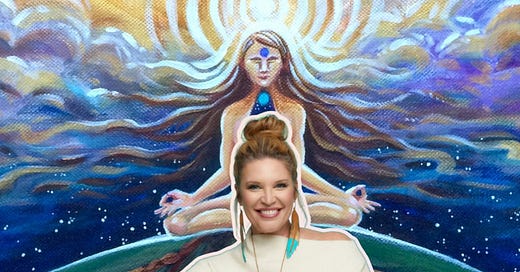Jen Hatmaker Awakens Her Mind to The ‘Mystery’ of ‘The Feminine Divine’
Last time we caught up with her, she was celebrating homosexuality, and being pro-transgender.
Jen Hatmaker, the popular I’m-pretending-to-be-a-Christian-but-I’m-actually-a-pagan mommy-blogger and podcaster that is quickly climbing the ranks from “Gadfly False Teacher” to “Arch-Heretic,” has continued to out herself as a vessel of inhabitation for shifty-eyed swine who’d rather not go off a cliff, reflecting on her spiritual transition from jewel to Jezebel and as she awakens herself to the mystery of “The Feminine Divine.”
Last time we caught up with her, she was celebrating homosexuality, and being pro-transgender. She also became a woke racial justice warrior by saying, “the center of the church has failed to be black, gay, and transgender, and lamenting the death of notorious pro-abort Ruth Bader Ginsberg, giving her the benediction, “Well done, good and faithful servant.”
In a March 2022 podcast where she interviews ex-Christian Dr. Christena Cleveland, she explains:
Most of us have heard the phrase at some point “God is a woman,” right? Maybe from Ariana Grande. Or maybe you’ve come across, like, thoughts and theology from others who have really mused about our creator using a wider lens, like scholars and theologians who have spent years and centuries, of course, looking into this idea of, like, the feminine divine.
And so, as can you imagine, there’s been quite a, because that creates quite a swirl in the sort of evangelical western Christian community. And not just that. I mean, even others, since most religions have had a very strong patriarchal bent since the beginning of time. They’ve been crafted and held together and governed by men.
And so those in power tend to shape their deities as they want to see them, which looks a lot like them, right? You know, so back in the day, somehow Jesus, who’s a Jew who lived in the Middle East, ends up being a Caucasian man with blue eyes and long brown hair, literally, over here, usually wearing, like, white robes. I don’t know. Maybe that was, the heart was right, I don’t know about fashion, but crafted into a different image.
It’s interesting, though, viewing Jesus as a white man and God as Father or as, you know, a man, period, emerging from the clouds, like, with this stern disposition and this sort of ruling with an iron fist and this powerful, almost punitive approach to humanity, generally serves one group of people and one gender.
According to Emily Tores, The ‘feminine divine’, or the ‘divine feminine is “the spiritual concept that there exists a feminine counterpart to the patriarchal and masculine worship structures that have long dominated organized religions. The divine feminine extends well beyond one belief system, and instead can be used as a spiritual lens to balance our perspective.” Hatmaker continues:
This idea, which makes it so painful and difficult for black and brown and female and LGBTQ+ communities to see themselves in this personification. Not just see themselves but feel safe with this God, right? Feel cherished. To feel protected. To feel included.
So it is the work of a lifetime, honestly, to upend those images and ideas of God and Jesus that we’ve been shown, well, at least for me my whole life. Because there’s something about this certainty around that type of just stern and strong and punitive God, that maybe the certainty of it feels good.
But I wonder, like, what if there’s ‘mystery’? What if there’s more mystery here than we’ve been taught, than we’ve been allowed to consider? What if God isn’t something or someone we can personify to fit our view of him? Like, what if one of the main things that the Bible tells us about God, that he is love, like, that center part doesn’t actually look like anything we can paint to suit our view but really can only be defined in that he is representative of all the people that he created, just as love, as for all, right? That’s not, that is not an outlier idea.
I mean, if that is the key message of how Jesus tried to get us to understand who God is and was, that love was the center of it, then it stands to reason that every human person in creation has a place with that, that God is representative of the people, right?
These are hard discussions, and they break apart some notions that feel safe to a lot of us. But they’re good, and they’re important, because they expand our thoughts. They expand our beliefs or even just our curiosity to this idea, this possibility that God cannot just be defined in one way, right?





